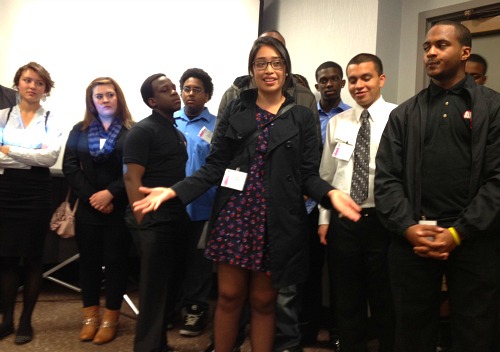Students leveraging tech for advocacy and libraries’ potential—highlights from the Digital Media and Learning Conference
It’s such a rare thing to see kids at a conference, and, ironic as it seems, one dedicated to education. So when I spied a large group of teens huddling in the Parc 55 hotel, site of the Digital Media and Learning Conference, I thought it might be a good idea to stick with them, and I wasn’t disappointed.
The kids—from Morningside, Crenshaw, Roosevelt, Locke, and Manual Arts high schools in Los Angeles—were on hand for a panel entitled “Education for a Digital Democracy.” In itself a brave move, the organizers essentially turned things over to the students, who conducted the entire session, demonstrating the potential of new media to empower kids and underscoring the need for us as a society to help make that happen more equitably across communities.
Tapping into Paulo Freire’s concept of critical pedagogy and using digital tools, the effort of Morningside’s students to determine for themselves the state of their school was both inspiring and heartrending. While 49 percent of kids access the Web to do homework, most students surveyed at the Inglewood, CA, campus find technology lacking, especially compared to wealthier schools on the west side of town.
“Students at my school are learning to type on T-Mobile Sidekicks,” said a Crenshaw student. At Crenshaw’s library, 10 out of 14 computers work, three of those can print, and almost all run on the Windows 2000 operating system. Kids also aired their frustration at not being allowed to use their smartphones or other personal devices in class (see clip below).
Using video, still photography, audio recording, and Web tools to tell their stories, students of all five schools—representing the Black Male Academy and the Council on Youth Research—are leveraging their data and new skills to advocate for themselves. “We demand access to computers,” declared one girl, “because there are students like me at Crenshaw who give a damn about their future.”
The role of libraries
One Crenshaw student described having to be driven by his father to the local public library, where he signed on for multiple one-hour slots on the computer to complete his homework. While the anecdote speaks to lack of access, it underscores, too, the critical role these public institutions play in providing services.
Libraries figured in throughout the conference, including Connected Learning, a new education model announced at DML. Funded by the MacArthur Foundation’s Digital Media and Learning Initiative, Connected Learning promotes an approach that spans the different aspects of a young person’s life: school, home, community and peer interaction, because learners achieve best when their learning is reinforced and supported in multiple settings that center on their interests, says Mimi Ito, cultural anthropologist at the University of California, Irvine, and principal investigator for Connected Learning.
The YouMedia program involving libraries is among those being examined as a model for participatory engagement in line with the Connected Learning concept, according to Connie Yowell, Director of Education at the MacArthur Foundation.
Heather Braum, technology librarian for the Northeast Kansas Library system, reflects on her experience at DML:




I also sat in on the Education for a Digital Democracy session. Personally, I appreciated when the kids genuinely asked the audience for suggestions on what they could do to improve/change their situations. It demonstrated the seriousness of these students to take an active role in shaping their and their classmates’ futures.
Also, thanks for the connected learning mention! If anyone is interested in further understanding what connected learning is and the research it is based on, I recommend visiting http://connectedlearning.tv/what-is-connected-learning. If you would like to participate in our weekly webinar series where we discuss connected learning and what it looks like in practice, check out http://connectedlearning.tv/weekly-webinar-series for the schedule.
-Jon Barilone
Community Manager
DML Research Hub